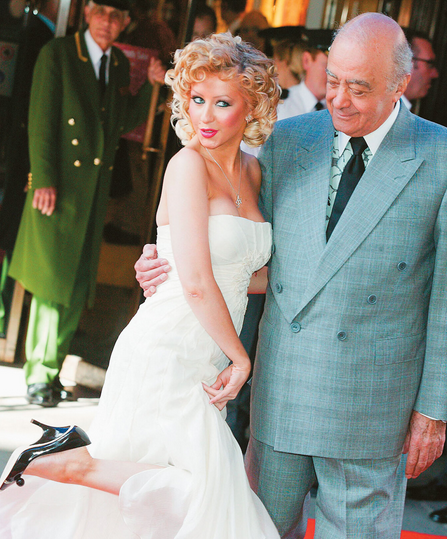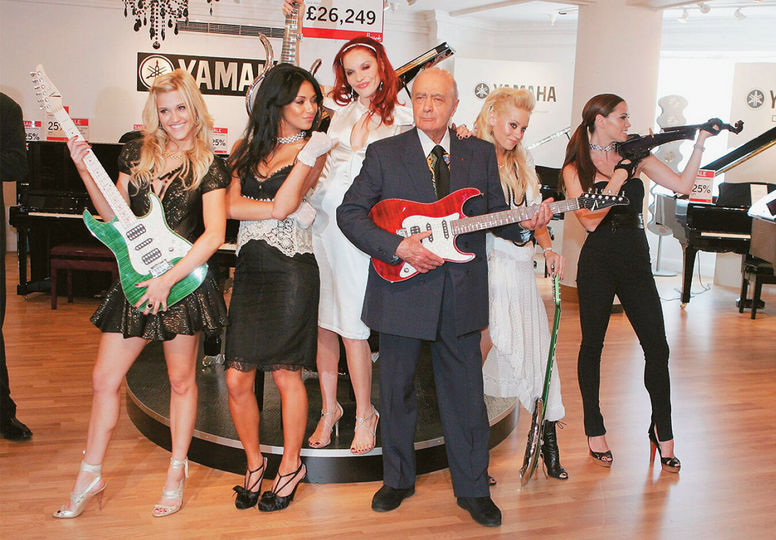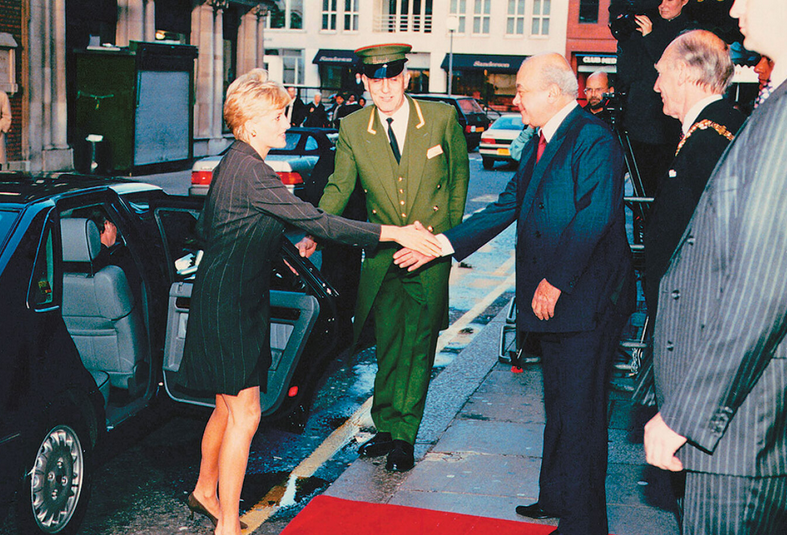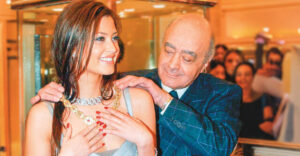Grotesque monster, sexual predator, ruthless beast. The testimonies of dozens of abused women reveal today that billionaire businessman Mohamed Al-Fayed was a horrific serial rapist. However, it took a year after his death for his nightmarish actions to come to light. For 40 years, the well-connected tycoon concealed his secret, silencing his victims through schemes, intimidation, and bribery.
Everything is now coming to light. The owner of the luxurious eight-story department store “Harrods,” the second-largest tourist attraction in London after Big Ben, had shown his voracious sexual aggressiveness early on. He had displayed his despotic behaviors since 1985 when he brazenly acquired the iconic retail store with the consent of then-Prime Minister Margaret Thatcher and the support of Conservative Party MPs. Indeed, during the laissez-faire years in Britain, he had renovated the faded, once-luxurious 19th-century building, which had decayed to the point of selling toilet paper on its first floor.
He spent millions on the restoration, installing the Room of Luxury and the Egyptian Hall, with his own face carved into the sphinxes around the mold. However, the truth is that this billionaire “pseudo-pharaoh,” as he was mocked in England, never distanced himself from his usual dealings and the murky transactions of his past. Like those under the forgotten Middle Eastern sensual moons, when, thanks to his mysterious dealings with one of the richest people in the world, Mahdi Al-Tahir, the right-hand man of Sheikh Rashid of Dubai, he organized lustful parties for the emirs.

The trap
He regularly roamed, like a hunter in search of his prey, the vast sales floors of the store and located the young women he found attractive. Then his trusted people would promote them, so that they could be work in the management offices on the top floor. In fact, they were making the most naive to lie down by force on the couches of the big boss.
The no-nonsense factory of aggressive sexual abuse gradually expanded into his sprawling flat at 60 Park Lane, facing Hyde Park. He then moved to the adjacent building at number 55 of the same street, also owned by the billionaire, as well as to his own “Dorchester” hotel next door, which was connected by a series of secret passages to the previous building. His promiscuous aggressive sexual behavior was gradually expanded abroad as well.
He raped or attempted to rape 15-year-old teenage girls and 25-year-old young women at the legendary Ritz hotel in Paris, which he had bought with his brother Ali as early as 1979. He repeated his hideous acts at Villa Windsor, also his property in the Forest of Boulogne, once the home of Nazi-minded abdicated King Edward VIII of England and his American wife Wallis Simpson, as well as his chalet in Gstaad.
In the opulent bedrooms in which, after forcing them to have sex in a silk robe, he asked his victims to call him “Daddy”. Only at the privately owned historic 14th-century pink stone castle of Balnagown in the Scottish Highlands did he not lead his victims. It wasn’t like it was far away from him. It’s just that his second wife, the Finnish former model Heini Vatten, and their four children regularly resided there.

Blackmail
The question, however, remains. Why was a domineering guy behaving like a deranged sex pasha never publicly denounced? His shocked, hurt, exhausted and psychologically wrecked young victims may have remained silent because they were ashamed that they did not strongly resist and push him away. Perhaps because they feared the social stigma after revealing the crime they suffered or because they were afraid that no one would believe them.
What is certain is that when some victims subsequently reacted, their actions were neutralized with intimidation and money. Some are alleged to have made themselves comfortable with long-term free use of some of the 50 flats in his Park Lane building and the donation of a car. Those who did not redeem their moral mark with meager material rewards what did they do? Νo one saw, heard, or even whispered a word about his abuses?
Not even a hint from his numerous service staff, his 40 bodyguards, the innumerable daily janitors, chauffeurs, gardeners, close business associates, controllers of his elaborate security system? Did none of them, supposedly, take notice of the vile practices of this predator? Although most of them shared the common secret that he liked to hire young, beautiful, blonde, attractive English saleswomen, they found nothing reprehensible in his choice. Agreed. Although everyone knew that he was aroused by Fulham’s women’s football players short shorts, they did not find his admiration reprehensible. And that’s acceptable.
Even the trade unionists did not say anything after the investigation of five cases of discrimination against the staff. In which the big boss treated his male workers like eunuchs and the women like concubines in a harem. Finally the matter was settled, unknown with what exchanges. In this routine scene of concealment, silence and submission to the boss, everyone swallowed their disgust and digested their shame. They were only limited to whispering “pity for the poor girl!” whenever they saw some distraught girl staggering down the spiraling bronze-clad Egyptian stairs of the popular department store from the upper floors crying.

And then, silence. Weak and dependent on the power of money and strong connections to the power of an unrepentant old man, they quietly returned to their jobs. Mohamed Fayed simply – having added by himself “Al” to his surname as a distinctive prefix of aristocratic origin, as the French have “de” and the Germans “von” – was a British citizen beyond all suspicion. Any suspicion, speculation, allegation or incriminating evidence of his abusive behavior that reached the press was met with threatening libel suits. And where he faced problems, he made agreements under the table.
In the 1990s he was one of the best-known public figures in the United Kingdom. He was the flamboyant Egyptian owner of the iconic Harrods. He hit the streets each time in a different Ferrari from his extensive fleet of Italian sports cars. He regularly appeared as a guest on television talk shows and entertainment shows. He organized charity galas in which he generously donated large sums to the needy of the country. His philanthropy was lauded with admiration by the media.
After all, which of them would ignore the department store’s substantial advertising budget? He also mingled with socialites and celebrities of the British elite whom he showered with elegant gifts from his shop. He lavishly entertained big business, oligarchs and Arab ambassadors at his sprawling Barrow Green Court country house in Surrey.
For its part, the British press had voluntarily swallowed whole the fairy tale created by the eminent businessman. That came from an “old privileged and well-established Egyptian family which, before being driven out by the socialist Nasser, for more than 100 years consisted of shipowners, landowners and industrialists in Egypt”. He sold the story that he himself grew up with British nannies, studied in English schools in his homeland and remains an incurable lover of the history, traditions and ethics of the United Kingdom.
His bogus narrative that was accompanied by bags of money was well received. Regardless of how obvious it was that he was being tortured by an inferiority complex, which stopped him from honestly admitting that he actually started out in the 50s as an outdoor soda hawker. To admit that he was struggling to get up in the slum of El Gomrok, meaning ‘The Customs House’, where he lived and traversing the alleyways of Alexandria’s old town to the Corniche beach to dispose of his wares.

Khashoggi
His entire demeanor suggested a self-important individual with a complete lack of emotional sensitivity or moral compass. He operated under the irrational certainty typical of a deeply entrenched figure who owed nothing to anyone. He was unaware that the path from poverty to recognition was paved for him by Samira Khashoggi, whom he met and married in Alexandria, with whom he had their son Dodi. The brother of his first wife was the infamous Saudi arms dealer, later dubbed the “king of kickbacks” and “lord of war,” Adnan Khashoggi.
The latter offered his brother-in-law access to circles of economic influence in London and connected him with the Emirates of the Arabian Gulf. Moreover, Mohammed’s father-in-law, the father of Adnan and Samira, was the personal doctor to the then king of Saudi Arabia, Abdulaziz. With such connections, the astute and manipulative brother-in-law seemed to have hit the jackpot.
Bribery
At the height of his business career, he hosted ministers and Tory MPs in comfortable suites overlooking Place Vendôme in Paris, at his famous luxurious and historic hotel, the Ritz. Due to his long-standing brazen mentality as a big spender, he bribed some of them with cash to raise questions in the House of Commons in favor of his interests. When the scandal broke in Westminster, the very same corrupter publicly admitted that he was paying them handsomely, indifferent to whether it would burn them politically or land them in prison for corruption.
He had no hesitation in protecting his own interests. The only thing that captivated him alongside his relentless ambition was the ever-increasing acceptance within British society. Tenacious and cunning, he sought to conquer it with his abundant wealth. He stubbornly aimed to infiltrate the lofty circle of English nobles, desperately seeking to associate with the British Crown.

Of course, Queen Elizabeth II was photographed with him after his £14m sponsorship of the Royal Stables’ traditional horse show in the private grounds of Windsor Castle, of which the monarch was patron of the event. He waited in vain to be knighted.
He was content to proudly advertise his shop’s exclusive supply of riding boots and saddles, housewares and linens to the British Royal Family. And that was it. The snobbish royalist cabal kept him at a distance from the palaces. To them the stocky, bald boss of Harrods in his plaid jacket and high-heeled boots to gain stature was a third-world con artist. The English Throne, moreover, was fully and accurately informed of how he had acquired “Harrods,” the crown jewel of English retail sales.
In the summer of 1984 Fayed appeared as the financial adviser to the Sultan of Brunei, the richest man in the world. Indeed, Sultan Hasanal Bolkiah with his untold fortune had commissioned to buy him a specially modified 747 jet. An aircraft with all the comforts but also adapted spaces so that the Sultan could fly non-stop from the capital of the Asian sultanate of Bandar Seri Begawan to London with his horses for polo matches. He gave him financial and legal freedom for this purpose. These assigned documents gave Fayed legal access to vast sums of the sultan’s colossal deposits, with bankers bowing before him.
Probably, unbeknownst to the Sultan, with his own money he made the offer – which no one could refuse – for the acquisition of “Harrods”. All the more reason to consider him a fraud, corrupt, cynical and manipulative. The Palace’s characterizations of him were so heavy and disparaging that his contemptuous address as a “wicked Oriental” looked like a compliment. Inevitably, his repeated applications for British citizenship were always rejected. British intelligence knew he had entered the country in 1974 on a Haitian passport.
He had previously settled for a few months on the Caribbean island with a Cuban passport that listed him as Sheikh Fayed! In Haiti, he sparred with the thick-skinned, brutal and corrupt dictator Bebe Doc Duvalier, with whom they competed on how to bring down each other financially. He bailed out of Port-au-Prince, leaving behind a large debts, but at least he had the Haitian passport.

Diana and Dodi
That summer evening in late June 1997, he hosted a private dinner for Princess Diana at the chic restaurant of the “Churchill” hotel in Portman Square, in the elegant Marylebone of Central London. Fayed was an old friend of her father, John Spencer, and her stepmother, Raine. It was a time when the disoriented princess was experiencing an existential and emotional deadlock. Her divorce from Prince Charles had been finalized the previous August 1996, but things were not adding up the way she hoped they would.

The shrewd businessman was betting on her, even though she was not at her best and did not have sufficient influence at the royal court. However, she was the mother of the queen’s grandchildren and of the heir to the English throne. It didn’t take long for the crafty Egyptian to exploit the circumstances with an eye toward the future.
“But what are you saying, Your Highness? Aren’t you going on holiday this year?” he feigned surprise after hearing her confessions. “Take the boys, board my yacht, and you will have your own house by the sea with a pool in the South of France,” he generously proposed to her. The manipulator, who humiliated others for his own benefit, had hit the jackpot. In her despair and loneliness, 36-year-old Diana, despite her brief polite hesitation she accepted.
By mid-July, she was sailing with her sons William and Harry in the Mediterranean, off the coast of Saint-Tropez, on the decks of the businessman’s 65-meter yacht, the “Jonikal.” There, Dodi also arrived. The 42-year-old son, with an inheritance of £100,000 a month and a producer of the Oscar-winning film “Chariots of Fire,” was tall, handsome, and had a playboy demeanor; he left his fiancée, American fashion model Kelly Fisher, in Paris and rushed to his father’s yacht.
The romance with his co-passenger, the princess, was only a matter of time. And it happened. Regardless of whether Fayed was the screenwriter of this romance and the two protagonists were puppets in his plot, the story of Dodi and Diana ended tragically and painfully, just a month later, with their disastrous deaths in the fatal car accident on August 31 of that year in Paris.
In the following years, drowned in pain, sorrow, and distress, Mohamed Fayed insisted fervently that the deaths of Diana and his son were murders orchestrated by the Palace and the British secret services. His claim, which bordered on conspiracy, was rejected by French and British investigators, the forensic experts of the fatal incident, as well as by an investigative court. Nevertheless, he continued to accuse the class-biased, vindictive, and spiteful English establishment. In 2011, he even funded an unfounded documentary titled “Unlawful Killing” to support what he passionately believed.
His bitter accusations, under the weight of his overwhelming loss as a parent, moved the broader public, which would not have supported him had they known that he was responsible for multiple rapes. A year earlier, after months of denial, he sold “Harrods” in 2010 to Qatar’s state investment fund for £1.5 billion. Almost half of the purchase price was used to settle the company’s debts. He also sold Fulham in 2013.
Now, at 85 years old, he was still reportedly committing rapes, unrepentant. He died last year, at the end of August, in deep old age, at 94 years. He was buried next to his son Dodi’s grave at the family estate in Surrey. He left behind a fortune of around £1.3 billion. But more importantly, he instilled abuse and fear in his victims.

Posthumously Accused
And now, what happens with the huge number of allegations of sexual assault and rape? His memory has been tarnished anyway. His death means he cannot face justice as a dead man. The lawyers representing 37 alleged victims of sexual abuse—while another 150 women have approached them for the same crimes against them by Fayed—are considering a civil claim against “Harrods.”
Because that is primarily where the slimy magnate committed his crimes, behind hermetically locked doors, with the tolerance or even the assistance of the department store’s managers. It would be a small vindication for his defenseless victims to extract a portion of the enormous fortune he bequeathed to his descendants. Regardless of what happens, what is certain is that a vain reputation is never bought with money. His obscurity in the annals of business will be everlasting.
Ask me anything
Explore related questions





